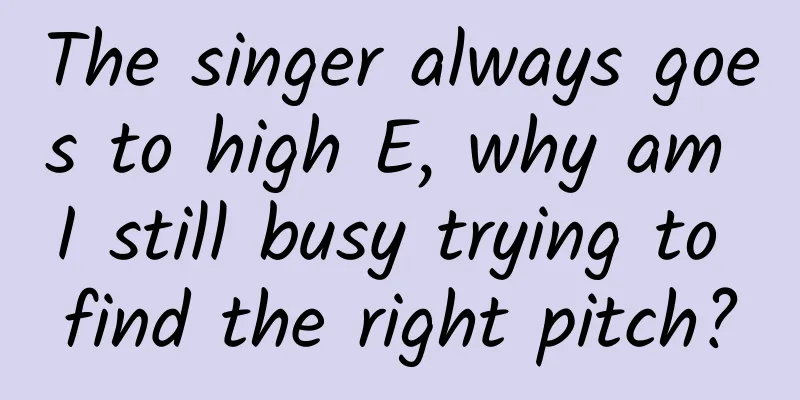The singer always goes to high E, why am I still busy trying to find the right pitch?

|
Editor’s Note: Watching "Singer" has become a pleasure for many friends every Friday night. The contestants are not afraid of live broadcasts, and they directly show off their skills. While enjoying the audio-visual feast, you can't help but "want": If I can sing like this... Then have you ever wondered why some people are born singers, while others will always be out of tune when they sing? The singers’ stage is on “Singer”, and our stage is on KTV. Every weekend and holiday, there are always enthusiastic people inviting everyone to sing karaoke, right? Unfortunately... for those of us whose voices have been kissed by angels, they are even more old-fashioned than Santa Claus! After so many years, why do they still sing karaoke? How can they sing better and better? Why are we still tone-deaf and singing like an acrobatic performance? The tone-deaf Detective Conan sings karaoke in the midst of the doting comments We don’t have a strong face like Conan. As a lonely person who has been playing with his phone silently in a corner of a KTV room for many years and only smiles with his face up in the chorus of drunken people, maybe you have heard of amusia a long time ago and proudly classified yourself as one of the few mentally ill people who are blessed by God? However, what is it like to really suffer from amusia? It is not as simple as "I was born singing out of tune", but some of it is bizarre and almost weird. After reading the following description of the condition, if you fall into this trap, don't be sad, there are many cool and great people who share the same pain as you. If you don't fall into the trap, maybe you will no longer be like Ye Gong who loves dragons, but instead comfort yourself like the advertisers of vocal classes: it must be just a lack of training? If you can train your ears to distinguish sounds, control your voice, and memorize songs, how difficult will it be to sing karaoke? However, even if you practice everything well, you may still sing out of tune. So, why are we tone-deaf? Part 1 Amusia = "I was born singing out of tune"? Before we proudly call ourselves amusiacs, we need to clarify what amusia is in the sense of musical cognitive neuroscience. The broad definition is simple: amusia is the loss of normal cognitive functioning of music. Strict classification is complicated. We probably haven't had a stroke or hit our heads, so we don't need to confuse it with those poor cases caused by acquired brain damage (for example, in 1870, a German musician was injured in the right brain and could play the melody he heard on the violin, but he couldn't play it on the piano). People with no history of brain damage and normal other cognitive functions (including sensitivity to environmental sounds and voices) may also suffer from amusia. These people are called congenital amusia patients and account for about 4% of the total population, which is not a small number. What are the symptoms? This is a bit like "What is it like to dream for a person born blind?" It is not easy to imagine unless you have the disease yourself. Let's first look at the cognitive object: music. To put it simply, its most basic elements include: Pitch ("do", "re", "mi"), rhythm ("qiangqiangqiqiangqi"), timbre (the sound of a flute or the song of a whale), etc. They are combined to form: Interval : the pitch relationship between two notes. Some intervals are harmonious and sound pleasant ("do" and "so" together), while some are disharmonic and sound harsh ("mi" and "fa" together). Melody: Notes of different pitches appear in an organized rhythmic pattern ("deng-deng, deng-deng, deng-deng, deng-deng"), and many melodies revolve around a main note and present a stable tune . Normal people who grow up under normal social conditions can hear whether two pitches, rhythms, timbres, and melodies are the same, whether the intervals are harmonious, and whether a certain pitch is harmonious with a melody or key (whether it is in tune or not). As for rhythm, even animals with speech-learning abilities, such as parrots or dolphins, can nod and bow to the beat and dance along. The enthusiastic parrot shook its head to the rhythm of its owner's guitar. Even after years of training, people with congenital amusia still have problems recognizing these musical elements, such as: Pitch detuning : adjacent pitches sound essentially the same. Beat deafness : unable to hear the rhythm. Interestingly, if there is no music but only the rhythm (such as a metronome), some patients can also find the beat. In other words, she can tap dance, do radio gymnastics, and sing labor songs while swinging a pickaxe, but whenever the music starts, she is confused. Amelodia : All songs basically sound the same. In other words, the Chinese music library, Western music history, Ali Planet, NetEase Cloud Village, Faye Wong and Joseph Pang Mailang... all added together, they are all the same, a terrible, noise. Loss of dissonance and tune : not being able to hear the harshness of dissonant intervals, not being able to hear dissonant notes in a melody or key (out of tune). Dystimbria : Chopin's Mazurka sounds like the kind of industrial noise that Blixa Bargeld of the band Collapsed New Architecture is good at. Chopin, the Polish piano poet who lived in Paris, and Bilixia, the German industrial noisemaker who lived in Beijing The above-mentioned problems may occur individually, for example, a person who cannot keep the beat correctly can distinguish clear and high notes, while a person who can distinguish clear and high notes cannot hear the melody or dissonance; it is more likely that they appear overlapping in the same person - what kind of extreme experience is this? An American patient who had this misfortune actually went to listen to an opera. According to her, "It was all like screaming!" Fortunately, she didn't come to listen to Hebei Bangzi. Research into the neural basis of congenital anhedonia is ongoing. To put it very simply, the processing of pitch, tonality, and harmony is mainly done by the auditory cortex of the right hemisphere (on the right side of the head). The processing of rhythm involves not only the auditory cortex of the left hemisphere , but also the motor cortex (on the top of the head), cerebellum, etc. Processing richer musical information involves more complex brain structures and neural pathways (such as those related to memory or emotion). Functional structure of the cerebral cortex The above hardware abnormalities cause various congenital amusia. For example, in a structure called the inferior frontal gyrus in the right hemisphere of the brain , patients have less white matter , more gray matter , and thicker cortex than normal people. This may affect the development of neural pathways related to music. Image from Hyde, KL et al. 2007 "Cortical Thickness in Congenital Amusia" For example, when hearing larger pitch changes, the discharge of some subcortical structures in the patient's brain is twice that of normal people, but when hearing smaller pitch changes, there is no reaction. Since no one likes to hear neuroanatomy terms and cannot remember them after hearing them, we will not go into details. Now, are you sure you are suffering from anhedonia? Part 2 The great congenital amusiacs If you are still sure, don't panic, it's just a matter of not spending money on the music industry. What’s more, there are so many ancient saints and wise men who are my fellow patients. General Grant , who won the Civil War, was a typical ameliac. He once told reporters: "I only know two tunes, one is "Yankee Minor" and the other is not." The implication is that the others sound the same. Che Guevara , the master of photo booths, was a typical patient of arrhythmia. Born in Argentina, he could not even hear the beat of tango and his dancing was a mess. He had no choice but to devote himself to math problems and guerrilla warfare. Grant did not like to listen to military music. The film "Motorcycle Diaries" reflects Guevara's dancing ability in a way that is basically true. Young people who are worried that tone-deafness will affect their literary writing can rest assured. Not to mention the physiological mechanism, there are existing masters to prove it: Yeats, the poet who wrote "When You Are Old", was also tone-deaf. Even more conclusive is Nabokov , the author of Lolita, who stated in his famous autobiography Speak, Memory: "I regret to say that music affects me only as a random series of sounds, which are more or less irritating... The piano and all the woodwind instruments in the concert, if they make a little noise, I feel bored, and if they make a lot of noise, it's like peeling my skin." The typical patients with aphonia, amelioration, loss of tune, loss of dissonance, and achromatopsia have been identified. Yeats suffered from dyslexia in his childhood and could not spell words correctly, which was probably related to amusia; Nabokov, who hated the sound of piano, had the male protagonist shoot the piano-playing rival at the end of Lolita. Part 3 Off-tune, off-key, tone-deaf, vocal training Before you finally get a diagnosis, you may notice something is wrong: After all this talk, why are people with congenital amusia unable to hear this or that?! We often talk about off-pitch! Off-tune! Tone-deaf! All about singing! I haven't even mentioned them yet! Are they considered amusia? Indeed, unlike the long-standing acquired amusia, congenital amusia is an emerging field in the past decade or so. Research has mostly focused on the abnormality of music perception function (ie "input", such as listening to music), but rarely involves the abnormality of music expression function (ie "output", such as singing). However, as for the latter, there is a concept that is still under discussion, called "poor-pitch singers", referring to those who always sing the wrong pitch or melody. Putting aside the temporary mistakes such as "off-tune", this concept is almost equivalent to the most commonly used meaning of "singing out of tune" or "tone-deaf". Zuo Xiaozuo, who has all the five notes, Chairman Ba, who is unstoppable, and Fan Debiao, who remembered the lyrics incorrectly but did not lose the tune. We are often encouraged like this: As long as you have good hearing and can hear that you are out of tune, there is hope! Practice your voice well, and then choose the right songs that suit your vocal range, and you will never be out of tune! In other words, as a singer with poor pitch, if we have a normal perception of music, can distinguish pitches, and have a sense of harmony, we can do as the vocal class brochure says: "With proper training, we can sing "Qinghai-Tibet Plateau"!" The tempting logic behind this statement is: If a person (1) knows what note to sing (perceptual function), trains himself to (2) be able to sing that note (expressive function), and (3) remember the entire melody (memory function), then he will not sing out of tune. Unfortunately, research has shown that there is a group of people who have normal ears, a wide vocal range, and a good memory. They possess all three of the above functions, but they are still out of tune. This is because the above reasoning ignores the fourth cognitive function, which is the coordination of the two functions of perceiving music and expressing music. Just like basketball players who know where the basket is and can shoot, but just can't make the shot - they know what to sing and can sing it, but they just can't sing it right! Even with proper training, "singers with poor pitch" account for 10% to 15% of the total population, which is not a small number. There is no hope for them. The golden kingdom of music is closed to the 4% of people who are born with amusia. The land of singing is closed to the 10%-15% of people who are tone-deaf and cannot be trained. If we don't belong to them, why on earth are we so tone-deaf? Maybe it's just laziness? Or maybe it's intentional. Produced by: Science Popularization China Author: Team of No. 16 Yinhe Road Producer: China Science Expo This article only represents the author's views and does not represent the position of China Science Expo This article was first published in China Science Expo (kepubolan) |
<<: Is the lard used by our ancestors good or bad? If you eat it often, you must read this!
>>: Does the "graviton" really exist? Condensed matter physics finds a "substitute"
Recommend
15 short video planning and promotion
An excellent short video often requires a good pl...
A list of plants that are mispronounced | You can read urticaria, but you can’t read “stinging nettle”?
The Chinese names of plants are like refined code...
Let iPhone connect to the Internet? iOS 10.2 hidden function exposed
OS has always been able to adapt to Ethernet conne...
Retweets exceeded one million in 6 hours, how does Alipay conduct social marketing?
During this National Day, Alipay did something bi...
Why is it said that the Jiangcun Tomb is the Mausoleum of Emperor Wen of Han?
On the morning of the 14th, the State Administrat...
Young people please eat less sweets! A study of 30,000 people found that drinking one cup of sugary drink a day increases the risk of colon polyps by 34%!
The incidence of colorectal cancer among young pe...
What does it mean when the dragon raises its head on February 2? What are the customs of February 2nd? You will know after reading this
Soon, the first month of the Renyin year will end...
The beautiful and "useless" Möbius inversion solves a class of physics problems [Part 1]
“Number theory provides us with an inexhaustible ...
It is called "soft gold in water" and China now produces it the largest amount in the world!
The golden and slightly charred skin, the soft an...
They say: A girl weighing 90 catties is fat, and a boy who is 1.78 meters tall is short
appendix: 1. A little-known fact about body shape...
Here are the 4 essential skills for new media writing!
The popularity of WeChat has also brought about a...
Will new energy vehicles face a second round of crackdowns?
On June 23, China Machinery Rolling Stock Technic...
Newbies can earn more than 10,000 yuan a month with this niche blue ocean lucrative project
There are many popular products on every platform...
The matching method of Baidu SEM promotion keywords has been upgraded!
What is keyword matching? Just like Cupid’s arrow ...
A new scam! Using "quantum technology" to grow crops can help fight diseases, disasters and increase yields?
Recently, a news program exposed a case of defrau...









